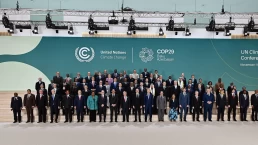Who pays is one of the oldest questions on the climate equity agenda. It’s time to answer it properly.
By Tom Athanasiou, Foreign Policy In Focus
I have for decades been assuring both colleagues and comrades that the climate negotiations are not a sick joke, that “COP” is not short for “Conference of Polluters,” that the negotiations matter. The argument has become easier to make as more people have come to see the implacable necessity of an international way forward. As imperfect as the COP process is, a world without multilateral climate negotiations would be far worse.
Still, there comes a time, amidst the floods and the firestorms, when even the practiced realism of seasoned observers must break down. This time didn’t quite come at COP29, though it came close. As Martin Wolf put it in the Financial Times, “the assessment has to lie between failure and disaster—failure, because progress is still possible, or disaster, because a good agreement will now be too late.”

The climate problem demands an earnest and cooperative international response, but Baku instead saw the Global North present the Global South with a “grim ultimatum”—agree to an inadequate offer of support or risk the collapse of the only international process where it has significant voice and influence. By its end, the Global South had been forced to accede. With the clap of the president’s gavel, and despite a broad push to assert that “no deal is better than a bad deal,” it got a very bad deal indeed.
There was also action on the emissions trading front, where the rules were finally nailed down. But the rules are pretty bad and the deal is more likely to generate a flood of illusory offsets than a flood of quality investment. Also, and importantly, neither carbon trading in particular nor private finance in general can honestly be expected to entirely finance a successful climate transition.
On the public finance side, the pressure to relitigate the Baku deal, already high, can only increase. The last-minute adoption of the “Baku to Belém Roadmap to 1.3 trillion”—a critical commitment to find a real path forward—is likely to define the COP30 agenda. The problem is that, barring an unanticipated political shift of the first order, the Belém COP, too, will fail to rise to the occasion.
The next year is going to be a big one.
Recent Posts
“Arrest Now, Ask Questions Later”: Why Did L.A. ICE Agents Arrest and Jail U.S. Citizen Andrea Velez?
July 3, 2025
Take Action Now “They didn’t have vests that said ICE or anything. Their cars didn’t have license plates. … Just because of the color of our…
Trump’s Big, Beautiful Bill Is Naked Class War
July 3, 2025
Take Action Now Trump’s “Big, Beautiful Bill” trades tax cuts on millionaires for the dissolution of society.By Hamilton Nolan, In These Times…
Mayor Mamdani’s First Day, A Zero Hour Conversation With Richard Wolff
July 2, 2025
Take Action Now If elected, what would Mayor Mamdani do on his first day in City Hall? How would a democratic socialist govern as a big-city mayor?……
The U.S. Is Funding A Bloodbath At Gaza Aid Centers
July 2, 2025
Take Action Now The admin just gave $30M to GHF, the organization at the center of charges that Israel is weaponizing assistance and shooting at…




